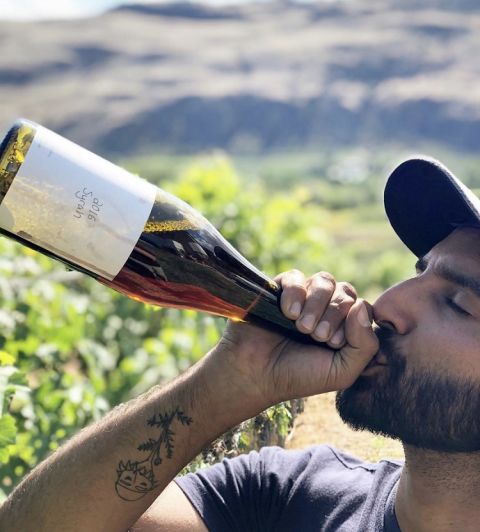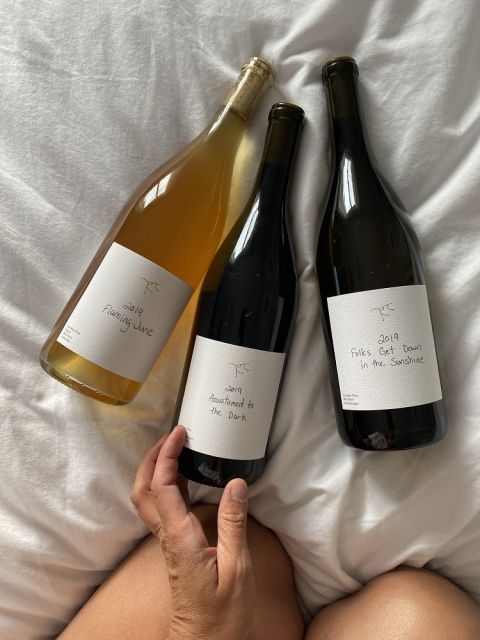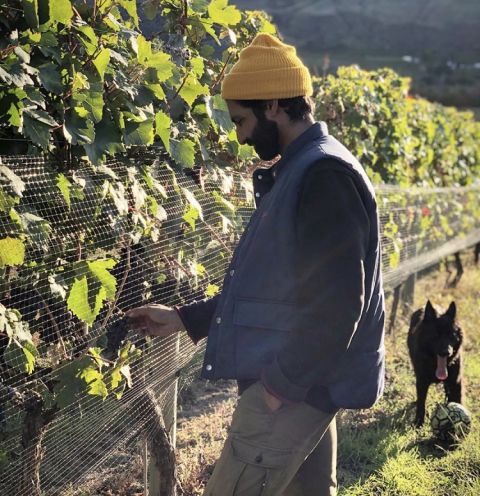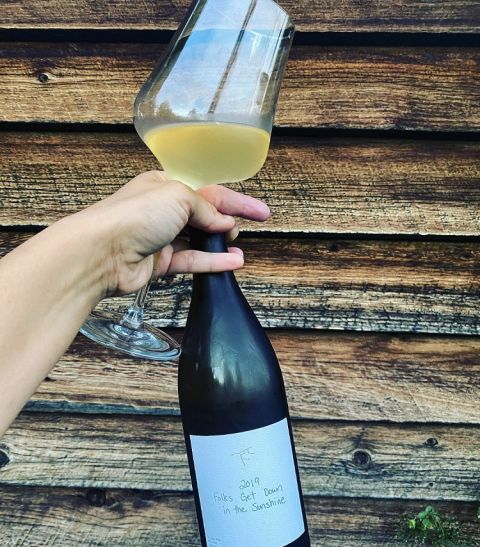WWC20 – Ursa Major, Okanagan Valley

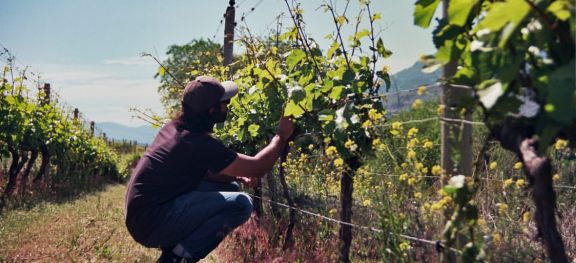
Today's entry to our writing competition is by Katie Truscott: 'a Canadian who returned to the Okanagan Valley, British Columbia in 2018 after grooming her palate for close to a decade in Johannesburg, South Africa. Katie discovered a passion for wine in 2016 when she started her formal education with the Wine and Spirits Education Trust (WSET). What was once an innocent curiosity has germinated into an unwavering, raw, where-have-you-been-all-my-life kind of passion; leaving her continually hungry for more. Currently in the middle of her WSET diploma, Katie enjoys writing about wine-inspired topics for her blog and posting pics to her wine related Instagram @katies.wine.life. By day, you can find her pouring wine and telling fun stories at Kitsch Wines in East Kelowna, British Columbia, living and loving her role as hospitality manager.' For more entries to our sustainability heroes writing competition, see this guide.
Sustainability is a simple yet extensive word. In order for something to be sustainable it must be capable of being sustained. In other words, sustainability is the action of utilizing resources, so they do not deplete, but rather carry on. If we want to achieve the ultimate goal of nourishing and maintaining our earth’s precious resources, we must understand that sustainability is a mindset. It is a dedication to the rolling wheel of life. Sustainability is not a quick solution, but a journey.
Rajen Toor (pictured above and below) is a self-taught winemaker living in the heart of the South Okanagan Valley where sustainability grounds itself in his family’s roots. Rajen’s parents and extended family immigrated to Canada in 1988 from Punjab. After some time in Winnipeg the family eventually settled on the rugged, raw and beautiful Black Sage Bench in the South Okanagan Valley, roughly 25 kilometers North of the U.S. border. Located on the eastern flank of the valley, the Black Sage Bench terroir is a combination of mostly sandy soil, with some pockets of gravel. There is no natural irrigation, and the hot afternoon summer sun can reach temperatures up to 39 degrees Celsius. Yields are lower but produce intensely flavoured grapes. The dense sage brush paired with the wild neutral desert colours feels like something out a John Wayne fantasy, a truly mesmerizing and unforgettable stretch of earth.
‘My family moved here when this property was an apple orchard. Ever since I can remember I’ve been running around the farm, playing in the soil and amongst the trees and vines. In 1994 we changed it all over to vines. My chores were work in the vineyard since I was a kid.’
In the mid-nineties, the apple orchard was converted to an award-winning vineyard and Desert Hills winery was established. After an eight-year stint in the USA in his twenties, Rajen moved back to the South Okanagan fueled with a passion for mother earth and a goal to lead the way towards organic conversion and sustainability on the family vineyard. He became assistant winemaker, working and learning alongside the talented Anthony Buchanan, head winemaker at Desert Hills. It wasn’t long after that he began his passion project, Ursa Major; a lineup of no-nonsense, hands off, open-minded wines. What started as a pet project grew to so much more in the summer of 2019 after the marketing manager of Desert Hills submitted (without his knowledge) his boutique portfolio to arguably the biggest Canadian judging competition Wine Align. This chance entry earned him a notable platinum for his 2016 Syrah and subsequently opened some big doors.
The image on every label is the constellation Ursa Major (aka Great Bear). Growing up on the vineyard, Rajen’s family used to get a visiting black bear and her cubs coming to snatch tons of grapes just before harvest. It became a game to get the grapes off the vine before mother bear.
‘My parents used to say that she was just trying to feed her family from these grapes, just as we were. That story really stuck.’
Winemaking has continued to change and develop the way Rajen looks at the earth, realizing over time how everything is interconnected.
‘I was born and raised on this land, and I'd like to see it part of a healthy cycle that gives and takes for many years to come. The more I learn, the more I implement into my daily practises.’
‘How can one respect the ethos of the process of growing grapes and producing wine without caring about the earth and the soil that it is grown on?’
In 2015, the United Nations Food and Agriculture Organisation told us that if current rates of degradation continue all of the world’s top soil could be gone in 60 years. A third of the world’s soil is already degraded. 95% of our food comes from soil, it is the basis of life. Causes of destruction such as, chemical heavy farming techniques, deforestation and global warming are all contributing to a bigger problem that most of us can begin to comprehend.
According to Volkert Engelsman, an activist with the International Federation of Organic Agriculture Movements, ‘We are losing 30 soccer fields of soil every minute, mostly due to intensive farming’.
Rajen is on the quest to convert his family’s farm to organic, with a deep love and dedication to the soils. The journey is certainly coming with its challenges as the soils are primarily sandy. Over the past two years Rajen and his family have brought as much organic matter into their soil as possible. From starting their own compost to switching from granulated fertilizer and bringing in outside compost. They are also enriching the soil with nutrients, especially nitrogen. The utilization of wild weeds already growing in the soil are in place with plans to plant cover crops this fall to help loosen up and moisten the soil. All of these steps to help support the life cycle of the land and keep is sustainable and fruit bearing for years to come.
‘I always source my grapes from organic vineyards, organic transition or organic practicing vineyards. I understand the oftentimes arbitrary usage of certification, so I try to get to know the growers and learn their ethos beforehand.’
The future is bright for Rajen Toor, a shining star on the bourgeoning Okanagan wine scene as he continues to drum up rightful attention for his charisma, non-snobbery, no nonsense and honest wines. Big plans for the future are in place as he looks towards 2021 and the planting of a small vineyard in Cawston, British Columbia, a distinct wine region of its own known for its organic roots and diversification. Rajen is moving forward with biodynamic practices for 200 bush vines of Cinsault and Counoise; unique and exciting varieties for not only this region but province and country as well.
The Okanagan Valley is a young, dynamic region with so many exciting stories to tell and be told. Rajen Toor not only brings promise, uniqueness and a special spice to this area but also a drive to do better and take care of what is actually not ours individually, but each other’s globally.
‘This land has given me so much, the very least I can do is everything in my power to keep it healthy, give it what it needs and bring back as much organic matter into the soil, so it can thrive for years to come.’
Become a member to view this article and thousands more!
- 15,408 featured articles
- 275,024 wine reviews
- Maps from The World Atlas of Wine, 8th edition (RRP £50)
- The Oxford Companion to Wine, 5th edition (RRP £50)
- Members’ forum
- 15,408 featured articles
- 275,024 wine reviews
- Maps from The World Atlas of Wine, 8th edition (RRP £50)
- The Oxford Companion to Wine, 5th edition (RRP £50)
- Members’ forum
- 48-hour preview of all scheduled articles
- Commercial use of our wine reviews
